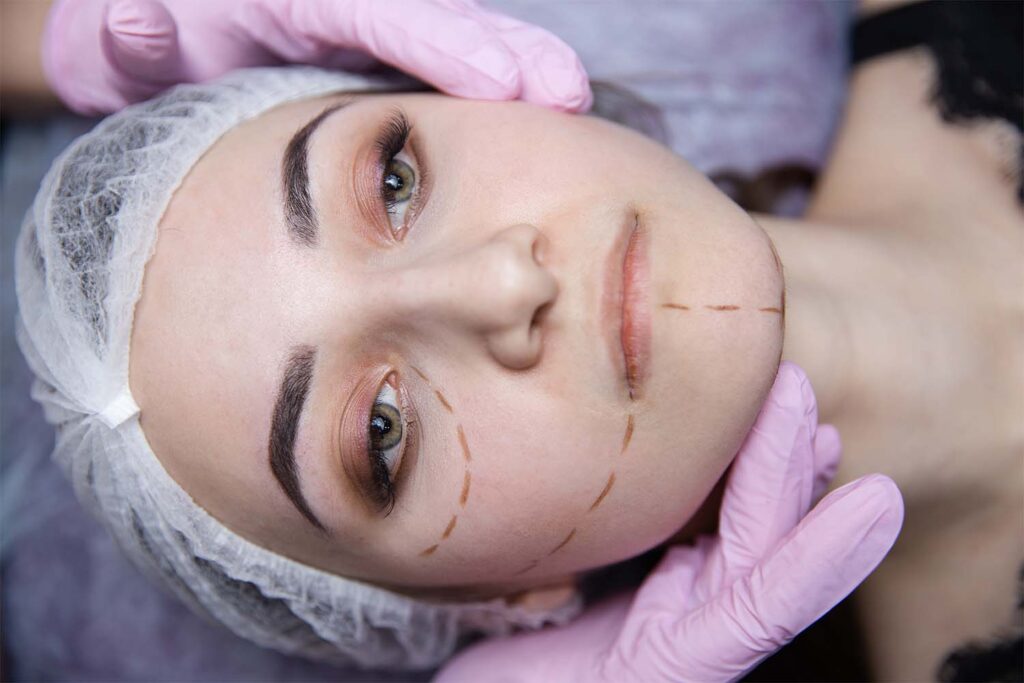Facial implants are a potential solution to aesthetic issues around the cheeks, jaw, and chin.
Here’s everything you need to know about facial implants, how they’re placed, and what to expect.
What Are Facial Implants?
Facial implants are usually made of safe materials that have been proven to be compatible with the human body with a low risk of rejection or allergic reaction. Facial implants may be made of silicone, polyethylene, expanded polytetrafluoroethylene.
Silicone facial implants have been used since the mid-20th century and are very rupture-resistant. Silicone facial implants are made of a solid form of the material, come in various shapes and sizes, and don’t usually fuse to the bone or merge with the tissue.
Polyethylene facial implants are porous and therefore more likely to attach to the tissue in the implantation area over time. At the same time, polyethylene facial implants are more rigid and are less easy to sculpt and shape.
Expanded polytetrafluoroethylene or Gore-Tex facial implants have been used since the late 20th century. Like regular polyethylene implants, they are quite porous, resulting in the fusion of the implants to the surrounding tissues. And while they may be difficult to remove as a result, these implants tend to have a high rate of success and satisfaction, with just 1.5% of patients removing or replacing the implants.
Where Are Facial Implants Placed?
Facial implants are commonly placed around the chin, cheeks, and jaw areas. Here’s what you need to know about each of these three different areas:
Chin
A chin augmentation using chin implants is the most common type of facial implant surgery. This procedure is able to enhance a small chin that’s disproportionate to other facial features and bring balance to the facial profile. Chin implants can be placed with a small incision on the underside of the chin or through the mouth along the gum line on the lower jaw.
Cheeks
A cheek augmentation using cheek implants is another common type of facial implant surgery. This procedure is able to add volume or lift to the cheeks for a more youthful and aesthetic appearance.
This procedure is ideal for those who have loss of volume or fat from around the malar areas or from flat or sunken cheekbones either naturally or due to aging. There are three different kinds of cheek implants, including malar implants, sub-malar implants, and combined implants.
Jaw
A jaw augmentation using jaw implants is the final type of facial implant surgery.
This procedure can strengthen and sharpen the jawline for a more pronounced and appealing look. Jaw implants can be placed with an incision along the jawbone and are often combined with chin implants and Nasal contouring. .
Why Would You Need Facial Implants?
Facial implants are used to improve and enhance facial contours. For example, if you have a soft jawline, you may want to consider jaw implants. Alternatively, if you have a small chin, you may want to get chin implants. Finally, if you have lost volume in the midface areas or have flat cheekbones, you may want to get cheek implants.
Who Is a Good Candidate for Facial Implants?
If you feel like you need facial implants, you next need to determine if you’re a good candidate for the procedure before you move forward in the process.
Facial implant surgery is best performed on patients whose head and skull have reached physical maturity. You may also be a good candidate for facial implants if you are physically healthy, do not smoke, and have positive yet realistic expectations for the procedure.
How Much Do Facial Implants Cost?
The cost of facial implants depends on where the implants are being placed, the experience of your plastic surgeon, and the geographic location of your surgeon’s office.
According to data from the American Society of Plastic Surgeons, the average cost of cheek implants is $3,669, and the average cost of chin implants is $3,137. However these prices vary considerably depending on the area and the surgeon.
However, it’s important to note that these figures only cover the basics of the procedure and may not cover things like anesthesia fees, facility costs, and medical tests. In most cases, facial implants are considered elective procedures and therefore are not covered by insurance.
What Can I Expect Before, During, and After Facial Implant Surgery?
Any surgical procedure can be quite intimidating, which is why knowing what to expect at every step along the way is key to calming your nerves and ensuring a positive result.
Before
Before facial implant surgery, you will have a consultation with a plastic surgeon, during which your doctor will go over your medical history and perform a physical exam to make sure that you’re a good candidate for the procedure.
They will also discuss your goals and concerns for the procedure to make sure that they’re realistic and that this is the best procedure to achieve your goals.
During
During the procedure, anesthesia will be administered to keep you comfortable. Incisions will be made, and the implants will be placed. Sutures or stitches will be used to close the incisions and allow them to heal.
After
After the procedure, you will be instructed by your surgeon to rest and avoid strenuous physical activity. You may also be prescribed medications for pain control and infection prevention.
Take these medications as directed and closely follow your surgeon’s post-operative instructions to promote healing and prevent complications.
How Can I Find a Surgeon for Facial Implants?
The best place to find a board-certified plastic surgeon for facial implants is with professional organizations such as the American Society of Plastic Surgeons and the American Board of Cosmetic Surgery. Just make sure to check reviews and results for any surgeon you’re considering.
Conclusion
Dr. Applebaum is a board-certified plastic surgeon who uses facial contouring with facial implants to create a beautiful, natural, proportional appearance that’s uniquely you. Thanks to decades of experience, Dr. Applebaum is able to create harmony among all of your features while still maintaining the unique qualities that make you who you are.
Reach out to Dr. Applebaum today to schedule an in-person or virtual consultation for more information about facial implants.
Sources:

